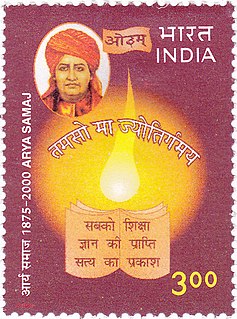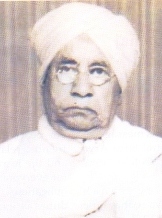
Arya Samaj is a monotheistic Indian Hindu reform movement that promotes values of based on the belief in the infallible authority of the Vedas. The samaj was founded by Maharishi Dayanand Saraswati on 10 April 1875. Members of the Arya Samaj reject idolatry.
The University of Fiji is a university based in Saweni, Lautoka, Fiji. It was established in December 2004 under academic leadership of the Fiji Institute of Applied Studies and financial sponsorship of the Arya Pratinidhi Sabha of Fiji, a Hindu religious organization dedicated to education." On 14 February 2016, the Native Lands Trust Board (NLTB) signed a 99-year lease with the university for the 5-hectare property, for which the university paid F$100,000. The university agreed in return to provide two scholarships annually for the children of landowners.
Pt. Vishnu Deo OBE was the first Fiji born and bred leader of the Indo-Fijians. From his initial election to the Legislative Council in 1929 to his retirement in 1959, he remained the most powerful Indo-Fijians political leader in Fiji. He was a staunch supporter of Arya Samaj in Fiji and also the editor of the first successful Hindi-language newspaper to be published in Fiji.

The Arya Samaj was the first religious, cultural and educational Fiji Indian organisation established in Fiji. From its inception, in 1904, it attracted the young, educated and progressive Hindus into its fold. During the first three decades of the twentieth century, it was the sole voice of the Indian community in Fiji and as Fiji Indians won political rights, it was not surprising that first Indian members of the Legislative Council were all Arya Samajis. The influence of Arya Samaj over the Indians in Fiji gradually waned as other organisations representing Indians were established but it remained the dominant force in politics until 1959. The modern day Arya Samaj in Fiji still speaks out on issues affecting its members and its activities are visible through the numerous educational institutions that it manages.
Pandit Shri Krishna Sharma was an Arya Samaj preacher who came to Fiji in 1926 from Rajkot, India. He was a gifted public speaker and singer of religious songs. He provided impetus to the Arya Samaj movement in Fiji. Under his influence Arya Samaj schools and temples were established in Fiji. He was responsible for the establishment of the Hindu Maha Sabha for the purpose of uniting all Hindus in Fiji. He advocated shuddhi and this caused conflict with Muslims and Christians in Fiji.

Pandit Ami Chandra Vidyalankar was an Indo-Fijian educator, preacher, labour leader, politician and football administrator. He served as a member of the Legislative Council between 1947 and 1953.

Thakur Kundan Pal Singh Kush (1881–1967) was an Arya Samaj missionary and teacher who arrived in Fiji, from Muzaffarnagar, Uttar Pradesh, India in 1928. He first taught at the Dharamshala School in Nausori where he later became the founding Head Teacher of Vunimono Arya School in 1929. He taught in a number of Arya Samaj schools which included Gurukul Primary School near Lautoka in 1939, Arya Samaj Girls' School in Saweni, Lautoka, from 1940 to 1945, Swami Shraddanand Memorial School in Suva, Vunikavikaloa Arya School in Ra, and Veisari Primary School near Suva.

The Arya Pratinidhi Sabha of Fiji is the national body for all the Arya Samajs in Fiji. It was formed in 1918 and registered as a religious body through the efforts of Manilal Doctor, who was in Fiji from 1912 to 1920 at the behest of Mahatma Gandhi to provide legal assistance to the Fiji Indians. Its first President was Swami Manoharanand Saraswati who had arrived in Fiji, from India, in 1913. The Arya Pratinidhi Sabha of Fiji is affiliated to Sarvadeshik Arya Pratinidhi Sabha based in New Delhi.

Suriname has possibly the highest proportion of Hindus who are Arya Samajis, compared to any other country. In Suriname, the Hindu population had split, with roughly 20% following the teachings of Swami Dayanand Saraswati, founder of the Ārya Samāj, and 80% following the Sanatan Dharm. According to the census of 2012 the number of Ārya Samājĩs is 16,661. The arrival of Arya Samaj preachers in Suriname, in 1929, caused a rift in the Hindu community, between the followers of Sanatan Dharm and the Ārya Samāj.

Arya Samaj is a Hindu reform movement in South Africa. Like other parts of the world where people of Indian origin are settled, the teachings of Swami Dayananda Saraswati, founder of the Arya Samaj, made their way to South Africa during the beginning of the twentieth century. The Arya Samaj encouraged Indian South Africans to take pride in their heritage and culture and promoted education and social reform.
Uday Singh Commissioner of Oaths, OBE, JP, was an Indo-Fijian landowner, social worker and politician. Like his close associate Mahendra Motibhai Patel, CBE, he was a staunch supporter of former Prime Minister Ratu Mara and the former Alliance Party. The Singh family is the single largest private landowner in Fiji.
This is a synopsis of organisations formed by Indians in Fiji. When they became free from the bondage of indenture and were able to organise themselves, they founded numerous organizations to seek social and political justice. These organisations promoted the teaching of Indian languages and religious practices and also to helped others in time of need. Some of the successful organisations are listed below in order in which they were established. Some, such as the National Federation Party, are no longer exclusively Indian, but are still predominantly so.

The Arya Samaj was founded in Nairobi on 5 July 1903, at a meeting at the home of Jai Gopal attended by forty-five people. The small group of Arya Samajis immediately began plans for a centre for its members and on 11 September 1903, the foundation for the first Arya Samaj building in East Africa was laid. Today there is a seven-storey building on this site.

Arya Samaj in Tanzania had been in existence since the early 1900s and prior to independence the whole of East Africa was served by a single Arya Samaj. After independence a separate Pratinidhi Sabha was formed in Tanzania on 19 July 1974.

Arya Samaj is a Hindu reform movement in Mauritius. Established in 1911, the Arya Paropkarini Sabha was officially registered in 1913. Since its creation Arya Samaj has had a great influence on the religious, social, educational and political lives of the people of Indian origin on the island. It has endeavoured to uphold the principles and ideals set forth by Maharishi Dayanand and his reformist movement. Some of the more notable ideals are women parity and free access to education. It has provided Hindus with a choice of progressive Hinduism, has promoted education with particular emphasis on Hindi and established orphanages, primary schools, colleges and tertiary institution.

Arya Samaj was first established in the cities of Mandalay and Rangoon in Burma in 1898. By the time the Arya Pratinidhi Sabha of Rangoon was formed in 1930, there were twenty-two Arya Samajs in Burma. The separation of Burma from India in 1937 was a setback for the Arya Samaj and the onset of the Second World War completely disrupted its activities.

The availability of Satyarth Prakash, inspired some people of Indian origin in Bangkok to follow the teachings of Swami Dayanand Saraswati and form the Vedic Dharam Pracharni Sabha on 5 May 1920. Weekly gatherings were held for the propagation of Vedic religion. Land was purchased and a Vedic mandir (temple) constructed. A library was also established. In 1922 the name of the Sabha (organisation) was changed to Arya Samaj and in 1923 it was affiliated with the Arya Pratinidhi Sabha of Uttar Pradesh in India. Although a small organisation, the Sabha has raised funds for relief fund for natural disasters in India. It also organises the celebration of Hindu festivals.

The earliest efforts to establish the Arya Samaj in Trinidad and Tobago were made by visiting missionaries in the beginning of the 20th century. In the 1930s their activities led to the establishment of a new organisation, which first was called the Arya Samaj Association, but later was renamed Arya Pratinidhi Sabha of Trinidad. The main activity of the sabha was giving support to the construction of Aryan temples and schools. Unfortunately the organisation was frequently plagued by split-offs, which caused a decrease of its membership.

The teachings of Swami Dayanand reached Guyana in the early 1900s but it was the arrival of missionary Bhai Parmānand in 1910 that led to the growth of Arya Samaj throughout the Colony. The Ārya Samāj doctrine rejects the idea of caste and the exclusive role of brahmins as religious leaders. The movement preaches monotheism and opposition to the use of images in worship as well as many traditional Hindu rituals.

Lala Hansraj also known as Mahatama Hansraj, was an Indian educationist and a follower of Arya Samaj movement founder, Swami Dayanand. He founded, with Gurudatta Vidhyarthi, the Dayanand Anglo-Vedic Schools System (D.A.V.) in Lahore in 1886, where the first D.A.V. school was set up in memory of Dayanand who had died three years earlier.





